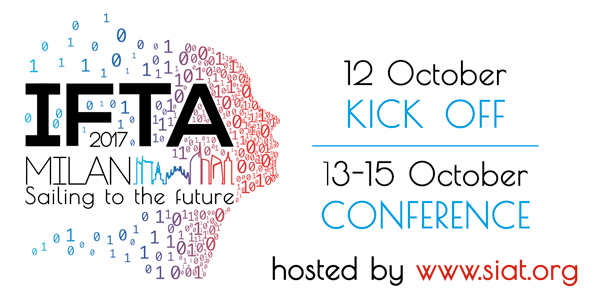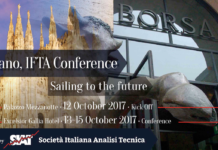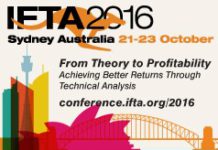Q: Hi Francesco, thanks for taking the time to talk to me. So first of all, what’s the story behind IFTA2017? How did it get started?
A: The choice of SIAT to propose to IFTA as host country for the conference is due to a number of factors. First, since nearly 20 years IFTA has not been held in Italy, a reasonably long time for a country with long traditions in technical analysis like ours. Second, in 2016 SIAT changed the directors and one of the cardinal points of the newly elected directors was just trying to bring again the World Conference in Italy. In addition, Italy and Milan in 2015 hosted the Expo and then everyone in the world had just heard about Milan.
Q: Why join IFTA 30th Annual Conference (3 reasons)? What can we expect?
A: Great speakers, a great venue (the Gallia Hotel is fantastic) and great evenings that will put together art, science, music and “haute cuisine”! To me, is enough: and to you?
Q: What guided your selection of speakers for this year’s IFTA?
A: The title of the conference, “Sailing to the future”, has been the guide because it allowed us to go beyond the usual thematics of Technical Analysis, exploring the sea of opportunities that has been originated by a totally new “quant” generation of technologies, markets and instruments. We will also try to go inside the vast thematic of the contamination between our discipline and many other fields of economics (i.e. Behavioural Finance, AI, Big Data, Cryptocurrencies), with top institutional and academic contributions. Each speech will be selected with regard to its added value to the participants and to the overall evolution of Technical Analysis.
Q: What’s the topic and the reason behind your IFTA speech?
A: I am a lucky man, it is the fourth time I have the opportunity to be an official IFTA speaker and I want to give something really special to those who will come to hear. I am a quantitative analyst with a deep love for cyclical analysis, two things that are quite difficult to put together. I will present a simple model that is part of a larger study on how statistical anomalies and patterns can be detected. I will also discuss how to use the model to structurally extract patterns and generate profits on every financial market (indices, sectors, stocks, commodities, currencies). The results will be surprising. The logical basis of this work is the observation that the creation of positive and negative performance on markets is profoundly irregular. The question is whether this irregularity actually hides some regularity. The research has been focused on finding an algorithm that sets the relationship between time and price. I hope this will be interesting!
Q: What made you decide to become a technical analyst?
A: It was a casual path at first, I was studying economics but I was specializing in a completely different part. As I ended up studying, I was left struck by technical analysis, because it led to a vision of markets completely different from the classical and institutionalized one. Then I was fortunate enough to have been taught by great masters, a fortune to which I joined a passion that has always gone a long way beyond simple work. I have given a lot of time and intensity to technical analysis, it was the driving force of my life, but I must say that technical analysis has given me a lot.
Q: When did you begin to analize and trade assets and what were your first successes/losses?
A: I started as a trader on currencies and interest rates when there were no futures in Italy yet. I remember some big trades on the currencies, but if I have to be honest, I remember better than the leaks. No one ever learns from their own successes, human beings learn only from mistakes and defeats.
Q: What did you learn from that?
A: I learned that discipline in markets is absolutely the most important asset. You have to be humble in front of the prices, which are the only reality that counts. I also learned that markets are machines to disappoint and that if there is a useless part, I would dare say even rather stupid of our discipline is the one that seeks to “foresee” the future. None of us, either individually or collectively, has the slightest idea of what the future will hold. We only have hopes and fears.
Q: What kind of portfolio manager are you? What markets (or strategy) do you prefer?
A: The evolution of my work encouraged me to become an asset manager and therefore my quantitative models also moved in this direction. Currently my company is advisor to a SICAV total return low vol that has about 80M of assets. But my projects are wider and certainly I will not stop at this fund, but I would like to move in the direction of CTA strategies, always with a quant engine but far more volatile and – I hope – profitable for investors.
Q: What is the main trait of a professional investment manager?
A: The perfect asset manager is a disciplined market reporter/crooner, for which only the analysis of the here and now counts. The rest are chat talks good for investment committees, that very often are one of the greatest waste of time in our era.
Q: What’s one of the biggest mistakes you see investors making these days?
A: I have no doubt about this: the lack of yield and the lack of alternatives and opportunities is inevitably leading to a collapse in the sense of risk. It looks as if an animal, indeed a herd, forced to look for food, ventured into the land of the fierce animals but wiped out of their minds the existence of these animals. A big risk, in perspective, but also an opportunity for those who will recognize this situation, because it could lead some markets (i.e. equities) to a classical bubble-and-burst scheme in the coming years. It’s quite unavoidable, this situation is unsustainable in the long term.
Q: What’s your perspective on the “investment environment” that’s evolved in the last few years?
A: I would synthesize it in two points: the boiled frog syndrome, which leads the investor to take more and more risk without realizing that the temperature of the water is getting warm, and the ostrich syndrome, which leads him to put his head under the sand because if I do not see a thing (the lion as a symbol of the risk), this thing does not exist.
Q: IYHO, is technical analysis still relevant today, especially with the prevalence of HFT? How does it deal with surprises in the markets, e.g. central bank announcements or fat finger events or even faulty algorithms?
A: Absolutely. More, there has been a silent contamination, in the sense that if on one hand the technical analysis was abused as useless, on the other side it was studied carefully, especially in its aspects related to behavioural finance and quantitative modelling. In fact, in recent years there has been an exponential growth in interest in our discipline in the institutional side of asset management and in the academic world. I think the most evolved part of technical analysis will be recognized at all levels in the future.
Q: For new analysts/traders just starting out, what is one essential skill you would recommend honing?
A: I think that the key challenge is credibility. We must break away from the image of financial alchemists and we must use at its best technology and all branches of our discipline that have a scientific basis or that can be traced back to quantitative or behavioral patterns. As they say in many fields, go big or go home.
Q: And lastly, is there anything particular you’d like to say about IFTA2017 to the people reading this interview that I might have missed asking about?
A: Yes. Technical analysis in Italy has grown a lot, both in terms of practitioners, especially with the advent of online trading, both in terms of quality. We must not forget that Italy has a great tradition and level: all the times that an Italian was confronted with major worldwide technical analysis has always obtained excellent results. I remember the World Trading Championships of Andrea Unger, Riccardo Ronco at European level (by the way both will be keynote speakers) and let me remember even my personal experience as twice winner of the Leonardo of financial research and recipient of the first edition of IFTA John Brooks Award. So, come to see the big names but do not forget that italians often do it better!



